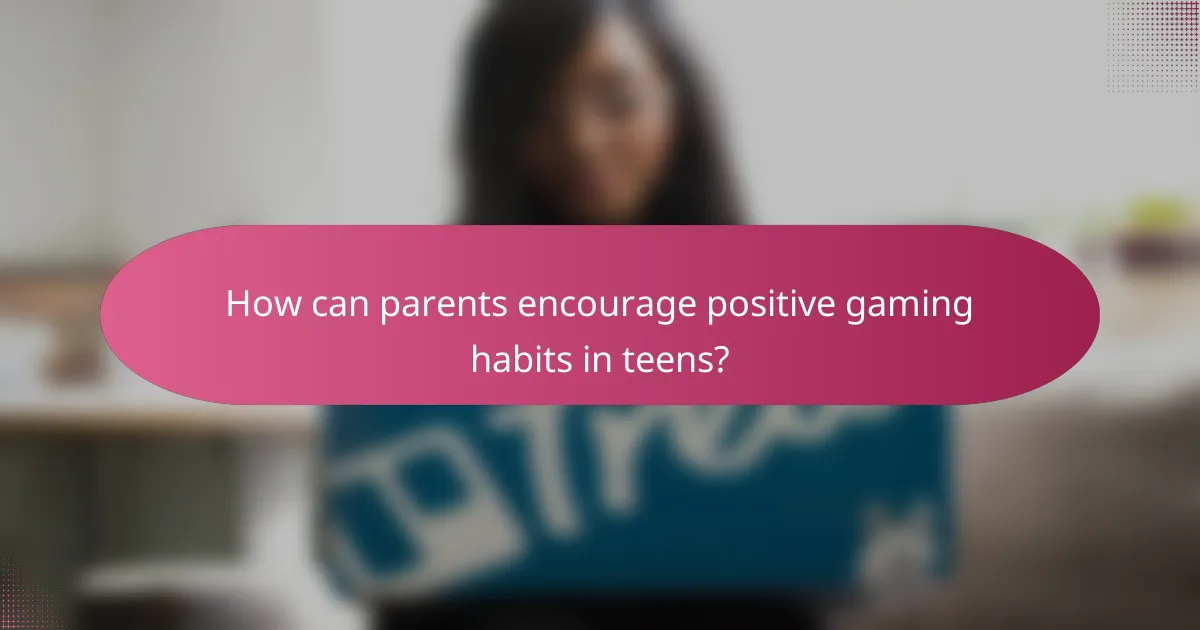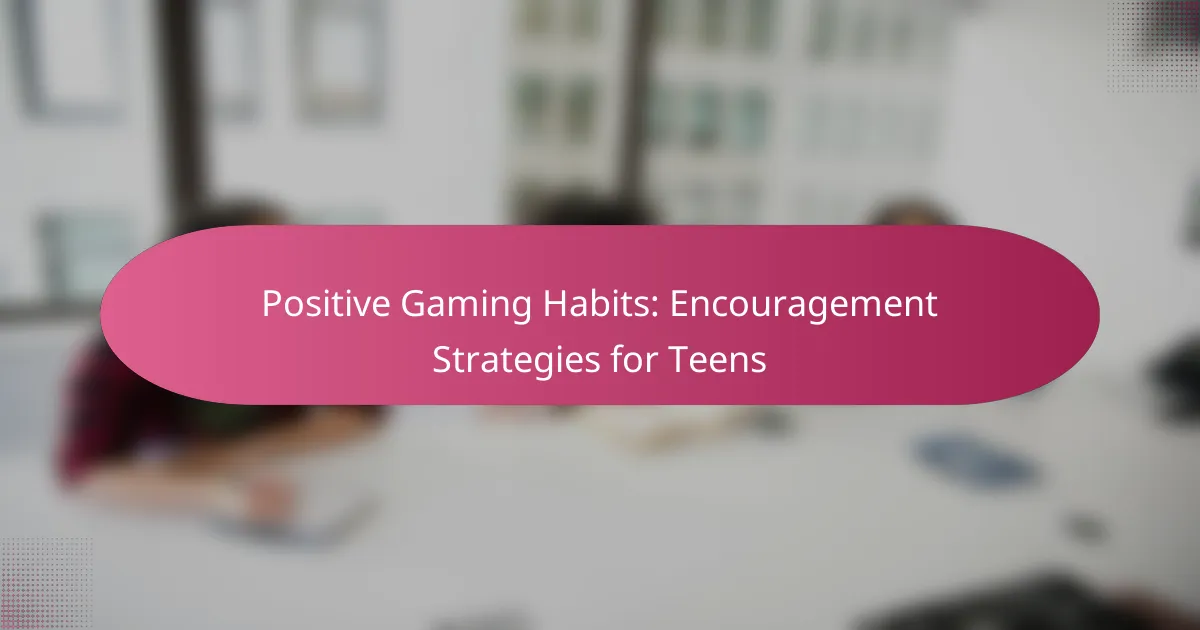Encouraging positive gaming habits in teens is essential for their overall well-being and development. By setting clear expectations and engaging with them in their gaming experiences, parents can help foster a healthy balance between gaming and other important activities. Implementing structured routines and utilizing tools to manage gaming time can further support teens in developing responsible and enjoyable gaming practices.

How can parents encourage positive gaming habits in teens?
Parents can encourage positive gaming habits in teens by setting clear expectations and engaging with them in their gaming experiences. This approach fosters a healthy balance between gaming and other activities while promoting responsible behavior.
Set clear gaming limits
Establishing specific gaming limits helps teens understand how much time they can spend playing games. For example, parents might set a rule of no more than two hours of gaming on weekdays and three hours on weekends. Consistently enforcing these limits can prevent excessive gaming and promote a balanced lifestyle.
It’s beneficial to involve teens in the discussion about these limits, allowing them to express their views and negotiate reasonable boundaries. This collaborative approach can lead to better compliance and understanding of the importance of moderation.
Promote educational games
Encouraging the use of educational games can enhance learning while still providing entertainment. Parents can look for games that focus on subjects like math, science, or language skills, which can be both fun and beneficial. For instance, games that involve problem-solving or critical thinking can help develop essential skills.
Additionally, parents can introduce games that require teamwork and strategy, fostering social skills and collaboration. This not only makes learning enjoyable but also reinforces positive gaming habits.
Engage in gaming together
Playing games together as a family can strengthen bonds and provide insight into a teen’s gaming interests. This shared experience allows parents to better understand the content and context of the games their teens are playing. It also opens up opportunities for discussions about game mechanics and strategies.
Moreover, engaging in gaming together can serve as a platform for teaching important lessons about teamwork, sportsmanship, and handling wins and losses gracefully. This involvement can lead to more meaningful conversations about gaming habits.
Discuss gaming content
Having open discussions about the content of games can help teens critically evaluate what they are playing. Parents should encourage teens to think about the themes, messages, and potential impacts of the games. This dialogue can help develop critical thinking skills and a deeper understanding of media consumption.
Parents can ask questions about characters, storylines, and gameplay choices, prompting teens to articulate their thoughts and feelings. This practice not only enhances comprehension but also fosters a more thoughtful approach to gaming.
Monitor gaming time
Regularly monitoring gaming time is essential for ensuring that teens adhere to the established limits. Parents can use tools like gaming consoles’ built-in parental controls or third-party apps to track playtime. This oversight helps maintain accountability and encourages responsible gaming habits.
It’s also important for parents to be aware of the types of games their teens are playing. Keeping an eye on both the duration and content can help identify any potential issues early on, allowing for timely discussions and interventions if necessary.

What are effective strategies for teens to develop healthy gaming habits?
Teens can develop healthy gaming habits by implementing structured routines, balancing gaming with physical activities, and practicing self-regulation techniques. These strategies help ensure that gaming remains a positive and enjoyable part of their lives without negatively impacting their well-being.
Establish a gaming schedule
Creating a gaming schedule helps teens manage their time effectively and prioritize other important activities. Setting specific gaming hours, such as one to two hours on weekdays and a bit more on weekends, can prevent excessive play and promote a balanced lifestyle.
Encourage teens to use a calendar or planner to block out gaming times alongside homework, chores, and social activities. This visual representation can help them see how gaming fits into their overall routine.
Incorporate physical activity
Integrating physical activity into a teen’s daily routine is crucial for maintaining overall health while gaming. Aim for at least 30 minutes of physical exercise most days of the week, which can include sports, walking, or even active video games that require movement.
Teens can set specific goals, such as taking a short walk after every hour of gaming or participating in a sport they enjoy. This not only promotes physical health but also enhances focus and mood, making gaming sessions more enjoyable.
Practice self-regulation techniques
Self-regulation techniques empower teens to control their gaming habits and recognize when they need to take breaks. Simple strategies include setting timers for gaming sessions and using reminders to encourage breaks every hour.
Teens can also benefit from mindfulness practices, such as deep breathing or short meditation, to help them stay aware of their gaming impulses. Encouraging them to reflect on their gaming experiences can foster a healthier relationship with gaming.

Which tools can help manage gaming time?
Managing gaming time effectively can be achieved through various tools designed to help monitor and limit play. These tools can assist in establishing healthy gaming habits for teens, ensuring they balance gaming with other responsibilities.
Use parental control apps
Parental control apps are essential for managing gaming time by allowing parents to set limits on how long teens can play. These applications often provide features like time restrictions, content filtering, and activity monitoring. Popular options include Qustodio, Norton Family, and Net Nanny, which are available for various devices.
When selecting a parental control app, consider ease of use and compatibility with your teen’s devices. Some apps may offer additional features, such as location tracking or social media monitoring, which can enhance overall safety. Always communicate openly with your teen about the reasons for using these tools to foster understanding.
Implement screen time trackers
Screen time trackers help monitor how much time teens spend on gaming and other screen activities. Many devices come with built-in screen time features, such as Apple’s Screen Time or Android’s Digital Wellbeing, which allow users to set daily limits and receive usage reports. These tools can encourage self-regulation by providing insights into gaming habits.
To effectively implement screen time trackers, set realistic daily limits based on your teen’s schedule and responsibilities. Encourage discussions about their gaming time and its impact on other activities, such as homework and social interactions. Regularly reviewing screen time data together can help reinforce positive gaming habits and promote a balanced lifestyle.

What role do peer influences play in gaming habits?
Peer influences significantly shape gaming habits among teens, often determining the types of games played and the amount of time spent gaming. Positive peer interactions can foster healthy gaming practices, while negative pressures may lead to excessive or unhealthy gaming behaviors.
Encourage positive peer interactions
Promoting positive peer interactions can enhance gaming experiences and encourage responsible habits. Teens should be encouraged to play games that emphasize teamwork, cooperation, and problem-solving, which can lead to constructive social engagement.
Parents and guardians can facilitate this by organizing group gaming sessions or encouraging participation in community gaming events. This not only builds friendships but also reinforces the idea that gaming can be a shared, enjoyable activity rather than a solitary escape.
Identify negative peer pressures
Recognizing negative peer pressures is crucial for maintaining healthy gaming habits. Teens may feel compelled to play certain games or spend excessive time gaming to fit in with their peers, which can lead to unhealthy behaviors.
To combat this, open conversations about gaming choices and time management are essential. Encourage teens to reflect on their gaming habits and consider whether their choices align with their values and well-being. Setting clear boundaries and promoting self-awareness can help mitigate the impact of negative influences.

How can schools support positive gaming habits?
Schools can play a crucial role in fostering positive gaming habits among teens by integrating gaming into their educational frameworks and promoting responsible gaming practices. By doing so, they can help students develop beneficial skills while minimizing potential negative impacts of excessive gaming.
Integrate gaming into educational programs
Incorporating gaming into educational programs can enhance engagement and learning outcomes. Schools can use educational games that promote critical thinking, teamwork, and problem-solving skills, aligning them with curriculum goals. For instance, math-based games can help students practice calculations in an interactive way.
Additionally, schools can create gaming clubs or competitions that encourage collaboration and healthy competition among students. This not only builds social skills but also allows students to explore various aspects of gaming, including game design and coding.
Host workshops on responsible gaming
Workshops focused on responsible gaming can educate students about the potential risks of gaming, such as addiction and social isolation. These sessions can provide practical strategies for balancing gaming with other activities, emphasizing moderation and self-regulation.
Schools should consider inviting experts to discuss topics like screen time management and the importance of offline activities. Providing resources and support for parents can also help them guide their teens in developing healthy gaming habits.

What are the long-term benefits of positive gaming habits?
Positive gaming habits can lead to various long-term benefits, including enhanced cognitive skills, improved social interactions, and better emotional regulation. By fostering a balanced approach to gaming, teens can develop skills that extend beyond the screen into their daily lives.
Improved social skills
Engaging in multiplayer games often requires teamwork and communication, which can significantly enhance social skills. Teens learn to collaborate with others, negotiate strategies, and resolve conflicts, all of which are essential in real-world interactions.
For example, participating in online gaming communities can help teens build friendships and develop a sense of belonging. These social connections can lead to improved self-esteem and a greater ability to navigate social situations outside of gaming.
To maximize the benefits, encourage teens to play games that promote teamwork and communication. Avoid games that isolate players or foster toxic environments, as these can hinder social development instead of enhancing it.
